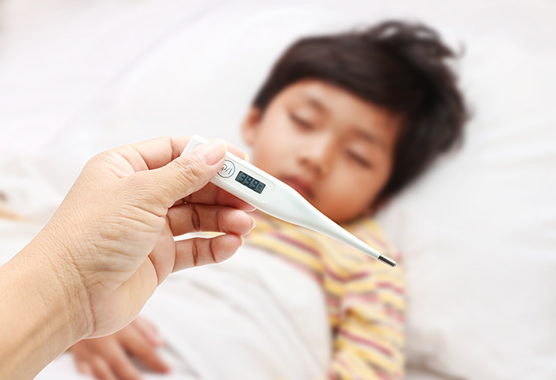Measles
Measles is a highly contagious illness caused by a virus. Our pediatric infectious disease specialists treat your child with compassion and expert care.
Medically reviewed by Dean Blumberg, M.D. on April 09, 2025.

What Is Measles?
Also called rubeola, measles is a highly contagious illness that results from a virus. It causes a rash, high fever, cough and bloodshot eyes. It can also lead to complications such as pneumonia and brain swelling, which can be life-threatening. Measles tends to occur in unvaccinated children, but adults can also contract the disease.
The pediatric infectious disease team at UC Davis Health has expertise in diagnosing and treating children with measles. We offer compassionate care for children with suspected and confirmed cases of the disease. We use state-of-the-art diagnostic tests and therapies in both inpatient and outpatient settings.
Measles Symptoms
Symptoms of measles usually appear seven to 14 days after exposure to the virus.
Common Symptoms
Signs of measles may include:
- High fever
- Cough
- Runny nose
- Red eyes
- Rash
- Tiredness
- Sore throat
- Diarrhea
- Stomach pain
- Vomiting
Emergency Symptoms
Measles can cause severe complications, especially in children under 5. These may include:
- Pneumonia
- Encephalitis (brain swelling)
- Blindness
- Dehydration (from severe diarrhea)
- Ear infections
- Preterm birth
Causes of Measles
Measles is caused by the measles virus (genus Morbillivirus). You can contract measles by:
Interacting With an Infected Person
This includes talking, shaking hands, sharing food or drinks, kissing or hugging. Even being in the same room with an infected person can lead to measles spread. The virus can live in the air up to two hours after an infected person has left the area.
Touching a Surface Contaminated With the Virus
If you touch a surface or object that came into contact with the virus and then touch your nose, mouth or eyes, you could contract measles.
Vertical Transmission
This happens when a person passes the virus to their baby during pregnancy, delivery or breastfeeding.
Risk Factors for Measles
Certain factors can increase your risk of contracting measles, including:
Being Unvaccinated
If you haven’t had the measles vaccine, you’re at a higher risk of getting measles.
Traveling Abroad
Traveling to countries where measles is more prevalent puts you at a higher risk of contracting the virus.
Being Deficient in Vitamin A
Not having enough vitamin A increases your risk of severe complications of measles.
Diagnosing Measles
We may be able to diagnose measles based on the symptoms your child has and a physical exam. We may also ask about their risk factors, including if they’ve traveled abroad, had contact with anyone who has measles and vaccination status.
If necessary, we may order tests to confirm a diagnosis, such as:
- Nose and/or throat swabs
- Urine tests
- Blood tests
Treatments for Measles
There is no cure for measles. But we can help alleviate your child’s symptoms with the following:
Over-the-counter medication
Fever reducers, such as such as acetaminophen (Tylenol), ibuprofen (Advil, Children's Motrin) or naproxen sodium (Aleve) can help bring down a fever that’s making your child uncomfortable.
Antibiotics
If your child develops pneumonia or an ear infection, we may prescribe them an antibiotic.
Vitamin A
A large dose of vitamin A can reduce the risk of severe complications from measles.
Preventing Measles
Measles is highly contagious, but you can avoid it by taking the following steps:
Get Vaccinated
The best way to prevent measles is by getting the measles, mumps and rubella (MMR) vaccine. Two doses of the vaccine are approximately 97% effective at preventing measles for life.
Avoid Contact
If anyone in your household has measles, avoid contact with them. Measles is highly contagious from about four days before the rash appears to four days after.
Symptoms of measles usually start
7-14Days after being exposed to the virus.
Two doses of the MMR vaccine are
97%Effective at preventing measles.
Source: Centers for Disease Control and Prevention: About Measles
Request an Appointment
As Sacramento's No. 1 hospital, you'll benefit from unique advantages in primary care and specialty care. This includes prevention, diagnosis and treatment options from experts in 150 specialties.
Referring Physicians
To refer a patient, submit an electronic referral form or call.
800-4-UCDAVIS
Patients
Call to make an appointment.
Consumer Resource Center
800-2-UCDAVIS

Ranked among the nation’s best hospitals
A U.S. News & World Report best hospital in cardiology, heart & vascular surgery, diabetes & endocrinology, ENT, geriatrics, neurology & neurosurgery, and pulmonology & lung surgery.

Ranked among the nation’s best children’s hospitals
U.S. News & World Report ranked UC Davis Children’s Hospital among the best in pediatric nephrology, orthopedics*, and pulmonology & lung surgery. (*Together with Shriners Children’s Northern California)

Ranked Sacramento’s #1 hospital
Ranked Sacramento’s #1 hospital by U.S. News, and high-performing in aortic valve surgery, back surgery (spinal fusion), COPD, colon cancer surgery, diabetes, gynecological cancer surgery, heart arrhythmia, heart failure, kidney failure, leukemia, lymphoma & myeloma, lung cancer surgery, pacemaker implantation, pneumonia, prostate cancer surgery, stroke, TAVR, cancer, orthopedics, gastroenterology & GI surgery, and urology.

The nation’s highest nursing honor
UC Davis Medical Center has received Magnet® recognition, the nation’s highest honor for nursing excellence.

World-class cancer care
One of ~59 U.S. cancer centers designated “comprehensive” by the National Cancer Institute.

A leader in health care equality
For the 13th consecutive year, UC Davis Medical Center has been recognized as an LGBTQ+ Healthcare Equality Leader by the educational arm of America’s largest civil rights organization.

